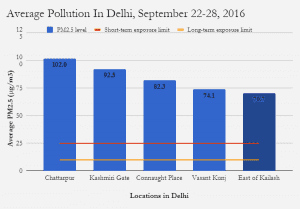The fault in our firecrackers : How Banning Firecrackers might not be an ideal solution
By Himanshu Dhingra
Over the past five years, Delhi’s air quality has been worsening amongst the mega-cities around the world, showing the highest levels of polluted air. In the year 2016, just after Diwali, the World Health Organisation (WHO) Urban Ambient Air Pollution database reported that Delhi’s air quality is 11 times more intoxicated than the standard breathable levels.
(ImageSource: IndiaSpend)
In response to this dwindling air quality, the Supreme Court of India ordered for a ban on the sale of firecrackers in Delhi NCR region, to prevent pollution during the 2017 Diwali season.
Nobody Owns It and Nobody Cares For It
The degrading air quality is the classic example of the Tragedy of the Collectives. Delhi’s air is a shared natural resource for the citizens of Delhi who are acting independently according to their own needs to enjoy bursting crackers. Thus, they behave contrary to the common good of all users and contribute to the depletion of the shared resource.
Every Delhi citizen behaves in its self-interest as there is no incentive to compel them to contribute to the common good or stop usage of crackers. There is also the absence of constraining power over the other citizens, if a citizen tries to lessen the usage of the crackers to prevent air pollution. This lack of incentive and constraining power on others eventually, disincentivizes the citizens and tends to worsen the condition of the resource in question (i.e. Delhi’s air).
Irrational Benevolent Experiment of Supreme Court of India
Lack of incentive and power in citizen’s hands tends to make the State responsible to guard Delhi’s air quality. To execute State’s duty, the Supreme Court of India passed a judgment banning cracker sale, suspending all the permanent and temporary licenses. The justification behind this disruptive judgment was to control the air contamination level this Diwali and to study the influence of Diwali crackers on the Delhi’s air quality levels. In short, to find out if it is really the fault of the firecrackers.
In November 2016, post the release of the WHO report, the Court in its judgement directed the Central Pollution Control Board (CPCB) to draft another report within three months stating the harmful effects of the chemicals used in the manufacturing of crackers.
On observing the CPCB carelessness, the court took this overreaching and irrational step by taking the matters in its own hands and directed to ban the sale of crackers this Diwali. As this benevolent decision is taken by the court for a social cause and to protect the fundamental right of the citizens i.e., Right to Life and access to breathable air, this overreaching action is justifiable.
But still, it is irrational as under this experiment, the Supreme Court unknowingly forgot to put proper wage on the implications of the ban. Banning always comes with unforeseen costs and this ban on selling of crackers will bring huge economic losses to the industry, vendors, and labor.
A newspaper report stated that “The 90-year-old Sivakasi Firecrackers industry whose annual turnover is billed at Rs 5,000 crore this year, fears that it might incur a 25 percent loss in as the products that have been supplied to dealers for sales in National Capital Region (NCR) of Delhi might be returned.”
Many studies have shown that banning something always results in the emergence of illegal trades, irrelevant violence and increases the unnecessary cost on the State. For instance, a prohibition on production and sale of alcohol in America during 1920 to 1933 generated a whole new black market of the beverage and a sixty percent hike in violent act. And another example is a state-wide ban on liquor sale in Gujarat, which gave rise to the black market. In 2013 alone, around 1,305 liquor smugglers were arrested in Greater Noida and 32,000 litres of smuggled liquor was seized and a large amount of fine was collected.
This current ban was a sudden development just before 10 days of Diwali, when most of the Delhi vendors had bought stocks of crackers for this Diwali season which will invariably give birth to another black market. To minimize their losses, these vendors will try to sell the crackers through illegal businesses in black which will create another problematic situation.
If it is the fault of the incessant burning of crackers, to cause this foggy polluted situation in Delhi, banning is still not the answer to the problem, as banning a substance will bring its own unbearable symptoms. It will destroy the markets; and their spontaneous flow of development, as it disincentivizes the market to move towards better solutions and innovations. By banning something, the Supreme Court hindered the spontaneous process of development and ignition of the innovation.
The solution could have been that the courts or State could have encouraged the manufacturers to innovate and produce more eco-friendly or smokeless crackers by pricing the usage of air. The companies producing low pollutant-emitting crackers or eco-friendly crackers will be impacting less amount of air. So, they could get the license to sell under the low-cost bandwidth from the government, as the cracker will be impacting the air quality less; thus, the company will be charged less for the license comparatively. In this way, it encourages the competition among the cracker companies to discover innovative approaches to reduce pollutant levels and reduce their cost to manufacture crackers.

